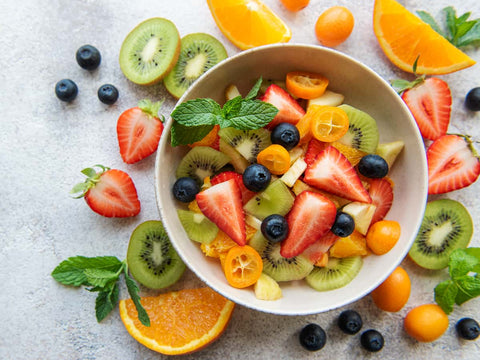Feeling bloated, gassy, or experiencing other digestive discomforts? Super enzymes might be your ticket to a happier gut. These potent digestive aids promise to break down food more efficiently, improve nutrient absorption, and alleviate common digestive problems. Let's dive into the world of super enzymes, exploring their benefits, top picks, and how they complement other gut health strategies.
Super Enzymes: Nature's Digestive Toolbox

Think of enzymes as tiny scissors that cut up your food into smaller, more manageable pieces. These chemical compounds are naturally produced by your body, mainly in the pancreas, and play a crucial role in breaking down carbohydrates, fats, and proteins.
- What Makes Them "Super": Super enzymes are typically blends of various digestive enzymes, often in higher concentrations than naturally occurring.
- Broad Spectrum Action: They tackle a range of food components, including lactose, gluten, and FODMAPs, which can be problematic for those with sensitivities.
Best Digestive Enzyme Supplements: What to Look For
- Comprehensive Formula: Look for a broad-spectrum enzyme blend that includes amylase (for carbs), protease (for protein), lipase (for fats), and potentially lactase (for dairy).
- High Potency: Higher amounts of enzymes (measured in HUT or FCC units) generally indicate a more potent product.
- Additional Ingredients: Some supplements include ingredients like probiotics or ginger to further support gut health.
- Quality & Reputation: Choose reputable brands that adhere to good manufacturing practices and provide clear labeling.
Digestive Enzymes vs. Probiotics: A Dynamic Duo for Gut Health

Both digestive enzymes and probiotics play crucial roles in your gut health, but they work in different ways:
- Enzymes: Break down food into absorbable nutrients.
- Probiotics: Live bacteria that colonize your gut and support a balanced microbiome.
Think of it this way: enzymes are the workers that prepare the food, while probiotics are the team that maintains a healthy gut environment. Using both can be a powerful strategy for optimal digestion.
Super Enzymes and Food Intolerances: A Helpful Tool
If you suspect food intolerances might be contributing to your digestive woes, super enzymes can offer temporary relief by helping your body break down those trigger foods.
- Not a Cure: While they alleviate symptoms, enzymes don't address the root cause of the intolerance.
- Food Sensitivity Testing: A premium food intolerance test can identify your specific triggers, allowing you to modify your diet and promote long-term gut health.
Recommended Super Enzymes for Women
While individual needs vary, here are a few top-rated brands:
1. Garden of Life Dr. Formulated Digestive Enzymes
2. NOW Foods Super Enzymes
3. Zenwise Health Digestive Enzymes
4. Nature Made Digestive Probiotics + Enzymes
5. MaryRuth's Vegan Digestive Enzymes
Beyond Supplements: A Holistic Approach to Digestive Health

- Chew Thoroughly: Take your time with meals to give your body a head start on digestion.
- Hydrate: Water is essential for all bodily processes, including digestion.
- Stress Management: Chronic stress can wreak havoc on your gut. Explore relaxation techniques like yoga or meditation.
- Gut-Friendly Diet: Prioritize whole foods, limit processed foods and sugar, and consider a food intolerance test to identify any triggers.
Disclaimer: This information is for educational purposes only and does not constitute medical advice. Consult your doctor before starting any new supplements or making significant dietary changes.
Frequently Asked Questions:
1. I'm experiencing bloating and gas after meals. Can super enzymes help?
Yes, super enzymes can often provide relief from bloating and gas by helping break down food more efficiently. However, it's important to determine the underlying cause of your symptoms. If it's a recurring issue, a food intolerance might be a factor.
2. I already take a probiotic. Do I still need digestive enzymes?
Yes! Probiotics and digestive enzymes work together but have different functions. Probiotics introduce beneficial bacteria to your gut, while enzymes help break down food for better digestion. Both can contribute to a healthier gut.
3. Can I take super enzymes every day?
While most super enzyme supplements are safe for daily use, it's best to follow the dosage instructions on the label and consult your doctor if you have any concerns.
4. Are there any side effects of taking digestive enzymes?
Most people tolerate them well, but some might experience mild side effects like gas, bloating, or nausea. If you have any concerns, stop taking them and consult your doctor.
5. Can I get digestive enzymes from food?
Yes, many foods naturally contain digestive enzymes. Pineapple, papaya, mango, and fermented foods like sauerkraut and kimchi are good sources. However, supplements offer a more concentrated dose and wider range of enzymes.


.png?v=1737390083)
.png?v=1737187409)


